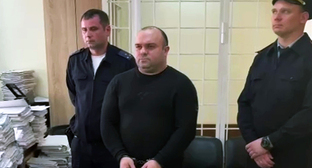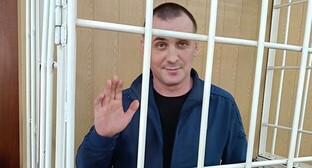16 May 2022, 14:36
Week in the Caucasus: review of main events of May 9-15, 2022
Arrival of refugees in Southern Russia; deaths in Ukraine of military personnel from southern regions of Russia, and persecution of pacifists; celebration of the Victory Day in Southern Russia; announcement of Alan Gagloev as the winner of the presidential election in South Ossetia; protest actions in Armenia demanding the resignation of Nikol Pashinyan; transfer of Mikhail Saakashvili to hospital, – see the review of these and other events in the Caucasus during the week of May 9-15, 2022, prepared by the “Caucasian Knot”.
Arrival of refugees in Southern Russia; deaths in Ukraine of military personnel from southern regions of Russia, and persecution of pacifists
Refugees continue to arrive from the zone of the Russian special military operation in Ukraine, launched on February 24. Over 11,500 residents of Donbass arrived in the Rostov Region in just one day on May 14. In total, according to the Border Guard Service Department for the Rostov Region of the FSB of Russia, in the period from May 9 to May 14, more than 83,500 residents of Donbass came across the border to the region. After refugees from the Lugansk and Donetsk People’s Republics (LPR and DPR, respectively) arrived in the Rostov Region, some of them pointed to difficulties in obtaining humanitarian aid. According to the refugees, to fill in the documents necessary for obtaining allowances, a person has to “run around” the offices of public institutions. Residents of the LPR, interviewed on May 10 in the city of Krasny Sulin by the “Caucasian Knot” correspondent, complained about delays in payments. Most of them came only to fill in the documents for allowances and intend to return home.
Almost every day, the authorities of the regions of Southern Russia report about the deaths in Ukraine of compatriots from among the military personnel. The “Caucasian Knot” runs a list of names of natives of Southern Russia who perished in Ukraine. The list has been based on the information officially confirmed by the authorities. By May 16, the information about at least 307 perished natives of Southern Russia has been confirmed, including 220 natives of the North-Caucasian Federal District (NCFD). Of them, 107 deceased were residents of Dagestan.
In Southern Russia, the persecution of residents who oppose the special military operation in Ukraine and related events continues. So, on May 15, sisters Larisa Mirgorodskaya and Irina Poznyakova were accused of discrediting the Russian armed forces under Article 20.3.3 of the Code of Administrative Offenses of the Russian Federation. The sisters went out to solo pickets with pacifist posters in Krasnodar. On May 13, a court in the city of Yessentuki imposed fines ranging from 30,000 to 35,000 roubles on three local residents, finding them guilty of discrediting the Russian armed forces. On May 12, Askhabali Alibekov, an activist from Novorossiysk, was fined 30,000 roubles for a solo pacifist picket under the article on discrediting the army. On May 10, a court sentenced Nikita Botberg to five days of administrative arrest. The activist was detained at the Immortal Regiment procession in Sochi for resisting lawful demands of the police. Policemen also drew up a protocol against him under the article on discrediting the Russian armed forces. Furthermore, this week, residents of Kabardino-Balkaria and Adygea were among those accused of discrediting the Russian armed forces. Fines and arrests under the same article were imposed on residents of Volgograd, Shakhty, and Vladikavkaz.
Celebration of Victory Day in Southern Russia
On May 9, the armed forces announced holiday parades in seven cities in Southern Russia, including Volgograd, Vladikavkaz, Kaspiysk, Novorossiysk, Novocherkassk, Rostov-on-Don, and Stavropol. In Southern Russia, only residents of Volgograd could see aircrafts participating in the Victory Parade, and in Rostov-on-Don, the aviation part of the parade was cancelled because of weather conditions – poor visibility. Besides, after a two-year break due to the coronavirus pandemic, the Immortal Regiment procession was held again in person in cities of Southern Russia. In Nalchik, according to the authorities, over 50,000 people took part in the Immortal Regiment procession. Residents of Kabardino-Balkaria came to the action with portraits of their fathers and grandfathers who fought in World War II. Participants of the Immortal Regiment procession in Volgograd also carried portraits of their relatives who fought in World War II, but there were also those who carried portraits of their relatives who perished in Ukraine in the spring of 2022.
Announcement of Alan Gagloev as winner of presidential election in South Ossetia
On May 14, the Central Election Commission (CEC) of South Ossetia announced the final data of voting in the second round of the presidential election in South Ossetia, which took place on May 8. According to those data, Alan Gagloev, the leader of the “Nykhas” Party, won 16,134 votes (56.09%), while incumbent South-Ossetian President Anatoly Bibilov gained 11,767 votes (40.90%). The CEC has also reported that the inauguration of Alan Gagloev will take place on May 24. Meanwhile, on May 13, Anatoly Bibilov signed a decree on holding a referendum on joining Russia on July 17. And two days earlier, Alan Gagloev said it was not the right time for the referendum. He noted that the referendum would be held when Russia gave the appropriate signal.
Protest actions in Armenia demanding resignation of Nikol Pashinyan
During the past week, the opposition in Armenia held protests demanding the resignation of Prime Minister Nikol Pashinyan. On May 9, at a rally, activists proposed the creation of an interim government after the overthrow of the Nikol Pashinyan’s government to modernize the unified security system of Armenia and Nagorno-Karabakh, reduce the powers of the prime minister, and strengthen the diplomatic corps. During the action of disobedience of the “Resistance” movement held in Yerevan on May 13, one of the government buildings was blocked for an hour. Activists will periodically block public institutions until Nikol Pashinyan resigns, the opposition says.
Transfer of Mikhail Saakashvili to hospital
On May 10, after protests demanding to transfer Mikhail Saakashvili to a foreign clinic for medical treatment, the Georgian authorities offered the former president of the country to undergo a medical examination at a clinic in Tbilisi, but the politician refused. However, on May 12, it was reported that Mikhail Saakashvili was transferred from the Rustavi prison for examination to the “Vivamed” clinic in Tbilisi. On May 13, Mikhail Saakashvili’s mother Giuli Alasaniya announced that Poland was ready to provide medical treatment for the former Georgian president and send a plane to Georgia for him. However, on the same day, Prime Minister Irakli Garibashvili called the information about his severe condition a speculation and ruled out transporting the politician for medical treatment abroad.
This article was originally published on the Russian page of 24/7 Internet agency ‘Caucasian Knot’ on May 16, 2022 at 10:00 am MSK. To access the full text of the article, click here.





Комментирование через Кавказский узел